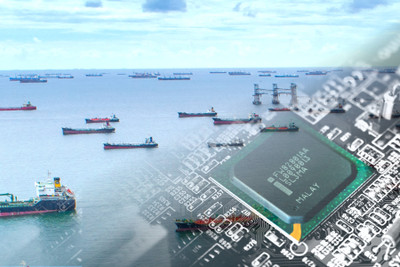Here's Why Businesses are Having More Challenges than Ever Getting Computers they used to Obtain Easily
Nov 26th 2021
Your New Normal
When COVID-19 first swept the globe, we all had to understand a "New Normal" to how we lived, how we worked and how businesses operated. In many ways the effects were immediate; but, in others we won’t see the impacts until much later. Two that are specifically crippling to businesses today are the global shortage of processor chips which are critical to the production of new computers, and the very well known supply chain issues which have brought the delivery of essential imported goods to a crawl.
In this blog we will look at how these effects are specifically impacting the computer industry today. Let’s start with the simple and well known conundrum of Supply and Demand.
An Immediate Surge in Demand

When the pandemic hit, companies and industries as a whole were not ready for what was to come. Hundreds of millions of people were suddenly in the market for technology to learn, work and live from the confines of their home. Demand drastically spiked for desktops, laptops, tablets, smartphones, gaming consoles, home entertainment, exercise equipment and other technology. This immediate uptick in demand would put a strain on even the most efficient operations, which we all experienced in the shortage of staple goods at our local grocery stores.
Inevitably, bottlenecks emerged. Issues like the delay of incoming raw materials, limited production staff, and outgoing shipping constraints all hindered companies from keeping up with the surge in demand. Very quickly, the limited inventory of finished technology products in domestic warehouses was gone, while overseas factories struggled to replenish stock.
So, now that we've considered the unforeseen spike in demand caused by Covid and it’s impacts to our New Normal, what other factors are contributing to the difficulties businesses are facing to get the computers they need?
Shutdowns and Reduced Worker Capacity
Under normal circumstances, a spike in demand would present very real supply challenges. With the additional impact of a global pandemic, however, we’ve all seen first-hand just how crippling the increase in orders and the reduction in work throughput has impacted our lives. Even for facilities who operate in countries where there has been little to no shutdown, they will oftentimes rely on other countries for critical raw materials and components. So, even if 95% of operations are handled internally, the remaining 5% could bring everything to a grinding halt.
When thinking of products that require many different components and raw materials, among the most complex and widely used would obviously be computers. And, because of a computer's complex make-up, there are many potential points of failure to maintain the high levels of production and supply to meet their growing demand. In this case there have been quite a few points of failure, but none more-so than the computer chip.
Struggles of the Computer Industry
The reasoning behind the relative scarcity of computer chips is simple. When looking across the most highly desired products during the pandemic, there is one common component they all require. A computer chip, or more specifically a semiconductor. Many industries are now fighting over a limited supply of these precious semiconductors which are essential to more devices and products we all use now more than ever before. Semiconductors aren’t just for computers any more. Now they’re being used all around us… in our cars, appliances, smartphones, wearable technology, and on and on and on. As they’ve become more prevalent in more of our everyday products, the demand for computer chips has regularly outpaced production.
Chip Shortage Expected Recovery
Those companies who require chips as a core component in their product all realized obtaining this key component was becoming exceedingly difficult. In an effort to avoid halts in production, plenty of companies bought as much as possible whenever more stock became available to them. This tactic helped steady the current levels of production for those specific companies, but further exacerbated the shortage on a broader scale. Now the semiconductor fabricators are working to restore their supply, but it's going to take some time.
 We expect the shortage to persist into 2023. It just takes that long to build capacity.
We expect the shortage to persist into 2023. It just takes that long to build capacity. 
- Patrick P. Gelsinger, CEO of Intel and Board Member of the Semiconductor Industry Association (SIA), said in an interview with Yahoo Finance.
 The shortages are going to continue indefinitely. Maybe that doesn’t mean 10 years, but certainly we’re not talking about quarters. We’re talking about years.
The shortages are going to continue indefinitely. Maybe that doesn’t mean 10 years, but certainly we’re not talking about quarters. We’re talking about years. 
- Brandon Kulik, head of Deloitte’s semiconductor industry practice, said in an interview with ARS Technica.
Another factor specifically for the US, is our relatively lower levels of semiconductor production versus the amount of semiconductors we purchase. The United States is responsible for 47% of the global market in purchasing of semiconductors, yet only produces about 12%. There is possibly some hope in sight for this getting better, with the CEO of Intel lobbying for the passing of the CHIPS Act. This is a bill which would like to “...restore American leadership in semiconductor manufacturing by increasing Federal incentives in order to enable advanced research and development, secure the supply chain, and ensure long-term national security and economic competitiveness.”
While this could potentially alleviate some of our supply chain issues, it would take years to build new factories and production lines, as well as hire and train employees. Thus, we are in no way “out of the woods” on this issue.
In theory, one would think we have survived the worst of the shortage. The peak surge in demand has passed. Supplies were drained, and now we have a chance to build up supplies again! While this should be true, it's not quite playing out so easily.
Making Matters Worse
Recently major manufacturing companies have been hit with disasters outside of the pandemic this past year. These disasters pertain to the extreme levels of heat produced when manufacturing semiconductors and printed circuit boards.
In Taiwan, the western-most third of the country is currently experiencing a drought, due to the lack of typhoons from last year. While a lack of typhoons seems like a good thing, it’s actually majorly affecting business for companies like TSMC and Micron. Here’s why.
There is a constant looming threat of fires starting in these fabrication factories, because of extremely high temperatures. In order to combat overheating, massive amounts of water are used daily for cooling. TSMC says they recycle 85% of the water they use, and yet they still need 41 million gallons of water for daily operations. However, due to the drought, companies like TSMC and Micron are having their water supplies trimmed down, which puts limitations on production capacity.
Meanwhile, shortages are stemming from another major producer of semiconductors in Japan, the company Renesas. Fires have broken out in three of their plants within the last year, which has resulted in production lines being completely halted for extended periods of time.
Solutions to Consider
For all the reasons above, combined with rising levels of inflation, it's becoming increasingly difficult for companies to navigate a path forward through all the uncertainty. Similar to what individuals are seeing at home with price volatility in the store and at the pumps, businesses are also being impacted with rising costs and prolonged order fulfillment. These unknowns can wreak havoc on profitability and forecasting, adding additional strain on how businesses will operate going forward.
You don't have to tolerate being price-gouged or left in the dark with endless uncertainty on when your products will arrive. There's a better way.
Microsoft Authorized Refurbished (MAR) computers provide an alternative new manufacturers can't deliver.
Blair Technology Group is a MAR who is uniquely positioned to help your business steer through these troubling times to ensure your employees have the computers they need to do their job well. Microsoft has named Blair Tech as their MAR Global Partner two years consecutively (2020 and 2021). This honor was achieved for four primary reasons...
- Our ability to fill orders quickly, because we have North America's largest supply of off-lease equipment in-stock
- Our consultative approach to create custom-tailored equipment to meet specific end user needs
- Our commitment to deliver systems of the highest quality, in like-new conditions, reduce the occurrence of returns and warranty issues.
- Our flexibility to support work-from-home employees with direct delivery, eliminating additional time and dollars from the fulfillment cycle.
Blair Technology has recognized how the chip shortage has created issues negatively impacting businesses. We've assisted many companies in their transition, so they now realize the benefits of Microsoft Authorized Refurbished computers. These partners are no longer burdened with uncertainties of when they will get their equipment, or if their P.O. will get cancelled before it's ever shipped. Their staff are staying productive with custom-tailored equipment so they can continue to do their jobs well. Many are also realizing cost savings from the unique value refurbished computers can deliver, helping their profitability while other operational costs are on the rise.
For many reasons it's clear businesses will need to change the way they handle their computer refreshes. So the question is, What is your company's plan to adapt?
The answer... We're ready when you are.

